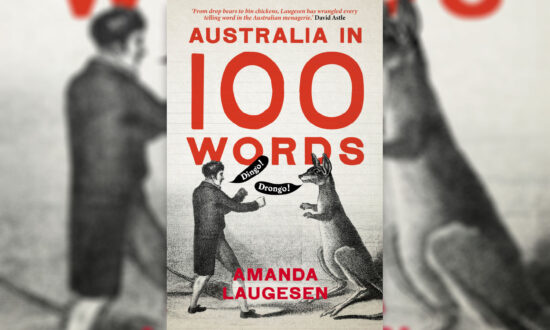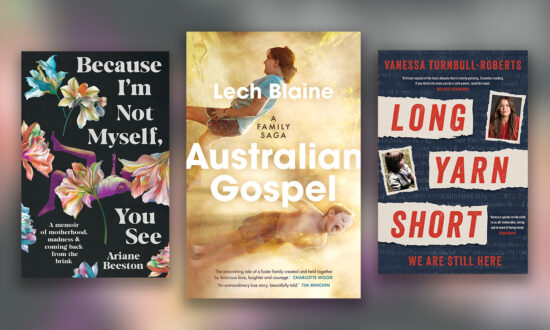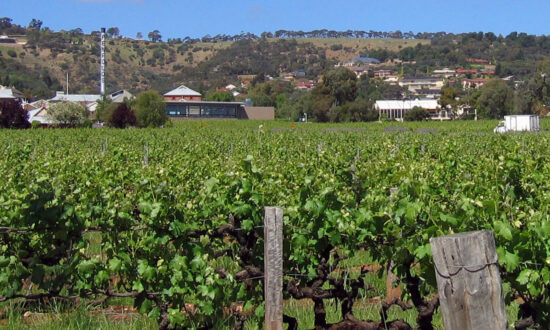“I’m looking for some good reads!” said one of our first customers, the Saturday morning before last. “I’m planning for the next lockdown.”
“Do you really think there’ll be another one?” I asked from behind my mask, hoping my words came out less muffled than they felt.
“Yep,” she said.
I wasn’t so sure there would be, but I wasn’t sure there wouldn’t, either.
That’s the way we’re all living these days, it seems – even here in Adelaide, one of the safest places in Australia. No certainty. Preparing for anything.
 The book I pushed into the lockdown-preparing customer’s hands is an immersive true-story page-turner that perfectly fits the mood of our times. With My Little Eye (Allen & Unwin) is a fascinating story of a family of Australian spies in the early days of ASIO, superbly told by journalist Sandra Hogan, in close co-operation with the family.
The book I pushed into the lockdown-preparing customer’s hands is an immersive true-story page-turner that perfectly fits the mood of our times. With My Little Eye (Allen & Unwin) is a fascinating story of a family of Australian spies in the early days of ASIO, superbly told by journalist Sandra Hogan, in close co-operation with the family.
Dad Dudley was recruited by ASIO in its earliest years, from the army, and his wife Joan soon came to work with him. Unusually, they told their three children about their work, training them in skills like memorising licence plates, surveillance and recognising small everyday anomalies that could indicate a concealed secret. “They learned spy craft from the time they could listen. If they noticed something different or out of place and mentioned it, they would see their mum and dad give each other a little look and they would feel as if they had got something right.”
This book unpicks Dudley’s double life (which also included affairs and a notorious crime boss as a best friend), his passionate partnership with Joan (whose own spy work is much later revealed to have been crucial), and the dynamics of a very tightly controlled and secretive family. It also explores the psychological legacy for the children of growing up the way they did, unable to tell anyone outside the family the truth of what their parents did, or of their everyday lives.
With My Little Eye is an absolutely fascinating read, which I was drawn to because I’m still a bit obsessed with TV spy drama The Americans (about Russian spies living double lives as an American couple in the 1980s). Like that show, the book is not just interesting for its spy drama, but for what the subterfuge of living a secret life does to families, relationships and to children as they grow up. I recommended it all day.
 “Have I given you Valentine?” asks Jason. The customer says no, and obediently buys it, along with my spy book recommendation. Jason has a way, as the best booksellers do, of convincing you that you’ll be missing out if you don’t read the book he’s raving about. And Valentine (Elizabeth Wetmore, HarperCollins), a novel about the effect of a brutal murder on a Texas oil town in 1976, is his go-to “rave about” book of the past year.
“Have I given you Valentine?” asks Jason. The customer says no, and obediently buys it, along with my spy book recommendation. Jason has a way, as the best booksellers do, of convincing you that you’ll be missing out if you don’t read the book he’s raving about. And Valentine (Elizabeth Wetmore, HarperCollins), a novel about the effect of a brutal murder on a Texas oil town in 1976, is his go-to “rave about” book of the past year.
Of the August books piled on our new releases table, the next one I am keen to read is one that Ben’s been recommending, Small Joys of Real Life, the debut novel by Melbourne writer Allee Richards (Hachette) which has been chosen to kick off Melbourne’s new citywide reading program, where each month its bookshops choose one new novel to collectively read and recommend.
The book’s cover, of a young woman riding a bicycle, somehow evokes Helen Garner’s Monkey Grip to me, with its single mother protagonist cycling between inner-north share houses. I was then interested to see that Mark Rubbo, owner of Readings in Melbourne and founder of the City Reads scheme, made the Monkey Grip comparison too. (The publisher also name-checks Sally Rooney… though every second 20-something novel these days gets this comparison.)
 Eva, an actor, is pregnant, after she connects and sleeps with Pat. When he dies, before anyone knows of her pregnancy, she has a decision to make. Suddenly, the world that she at times already questioned, her career, her roommates and friends, and life in the inner-city are all even harder to navigate. Her best friends, Sarah and Annie, are also dealing with the shifts and changes of their late 20s, and each of them will at times let the others down.
Eva, an actor, is pregnant, after she connects and sleeps with Pat. When he dies, before anyone knows of her pregnancy, she has a decision to make. Suddenly, the world that she at times already questioned, her career, her roommates and friends, and life in the inner-city are all even harder to navigate. Her best friends, Sarah and Annie, are also dealing with the shifts and changes of their late 20s, and each of them will at times let the others down.
Richards’ short stories have been published widely, and this novel was shortlisted for both the Victorian Premier’s Literary Award for an Unpublished Manuscript and the Richell Prize for Emerging Writers. It looks tremendously promising!
Max, one of our regular customers, comes to browse while I’m dusting the science shelves, towards the last leg of my shift. We’ve been messaging about The Americans since he saw me post about it on Instagram, but this is our first chance to talk about it in person. Like so many great bookshop conversations, we dip in and out of subjects as I dust (and then abandon all pretence of dusting): The Americans, the spy book, musicals, Marilyn Monroe and Jane Russell, what we’re going to read next.
I show Max my book pile on the counter. One of the books is Everyone in This Room Will Someday Be Dead by Emily Austin (Atlantic), a new novel that I’ve been seeing all over Instagram (“I guess it works,” I admit), compared to Sally Rooney. “It’s one of those anxiety novels,” I tell Max. “So I have to read it. I read all the others.” Not all (maybe), but it is true that Meg Mason’s Sorrow and Bliss was my favourite novel last year, Naoise Dolan’s Exciting Times was another favourite, and I adore Sally Rooney. I say I am cynical about comparisons, but I did buy this book on that basis.
 It opens with Gilda, the protagonist, getting into a car accident, breaking her arm, and calmly visiting the emergency room in her local hospital, where the staff all know her because she regularly presents certain that she’s dying, but actually suffering anxiety symptoms. Recently fired from her bookshop job for not turning up to work (I confess, I had little sympathy for this!), she accidentally gets a job as an admin assistant at a Catholic church when she turns up for free therapy and they mistake her as a job applicant. Gilda is a gay atheist, but pretends to be a heterosexual Catholic – the hardest part of the job by far, given that her boss is amazed and impressed when she says she knows how to use a computer and email.
It opens with Gilda, the protagonist, getting into a car accident, breaking her arm, and calmly visiting the emergency room in her local hospital, where the staff all know her because she regularly presents certain that she’s dying, but actually suffering anxiety symptoms. Recently fired from her bookshop job for not turning up to work (I confess, I had little sympathy for this!), she accidentally gets a job as an admin assistant at a Catholic church when she turns up for free therapy and they mistake her as a job applicant. Gilda is a gay atheist, but pretends to be a heterosexual Catholic – the hardest part of the job by far, given that her boss is amazed and impressed when she says she knows how to use a computer and email.
There is a mystery around the possible murder of Gilda’s predecessor, the problem of evading being set up with a handsome, annoying Italian by a parishioner, and a romance with the kind, long-suffering Eleanor. And simmering between chapters and below the surface of the novel, there is a family determinedly ignoring each other’s psychological issues and their collective dysfunction, until it boils over. Below the surface quirk is an authentic exploration of human sadness and insecurity, and how it can obscure love.
“I reckon this kind of book – Sally Rooney, Sorrow and Bliss – is what, when people look back, will define our era. What we were reading then,” says Max. I think he’s probably right.
 One book that reminds me of what we were reading back in the late 1980s is Billy Summers, a new book by Stephen King (Hachette). When I was in high school, he’s the author I remember people reading. We’d swap copies of It and Pet Cemetery and Carrie and Christine: battered black covers with raised red or gold lettering. (Which reminds me, we also read Virginia Andrews’ strange gothic novels of brother-sister incest, arsenic cookies, and children locked away by their mother: the Flowers in the Attic series. Stephen King was positively wholesome next to that.)
One book that reminds me of what we were reading back in the late 1980s is Billy Summers, a new book by Stephen King (Hachette). When I was in high school, he’s the author I remember people reading. We’d swap copies of It and Pet Cemetery and Carrie and Christine: battered black covers with raised red or gold lettering. (Which reminds me, we also read Virginia Andrews’ strange gothic novels of brother-sister incest, arsenic cookies, and children locked away by their mother: the Flowers in the Attic series. Stephen King was positively wholesome next to that.)
The new Stephen King (blue cover, gold lettering) is the story of a contract killer, an ex-marine, with one last payday to earn before he retires. Billy Summers is the best killer for hire in the business – though he’ll only do the job if it’s a truly bad guy. Now, he’s doing one last hit before he retires: one of the best snipers in the world, a decorated Iraq war vet who is a Houdini when it comes to vanishing after the job is done.
Ben comes in to pick up a magazine, and we start talking about a book we both read, and the weekend reviews, and then Max and I try to convince him to watch The Americans. My shift is over. We try to convince Jason to watch The Americans. We talk about Max’s beard. Somehow, an hour passes. The shop is about to shut.
I pile my books into my back bike basket – a mix of new and soon to be published – and cycle off down Hindley Street as Jason locks the front door, still buzzing. I did inhale a one-dollar raspberry frozen Coke on my lunch break. Is it a sugar high? No, I decide. It’s the bookshop.
Jo Case is a bookseller at Imprints Booksellers on Hindley Street and an associate publisher at Wakefield Press.
Support local arts journalism
Your support will help us continue the important work of InReview in publishing free professional journalism that celebrates, interrogates and amplifies arts and culture in South Australia.
Donate Here




